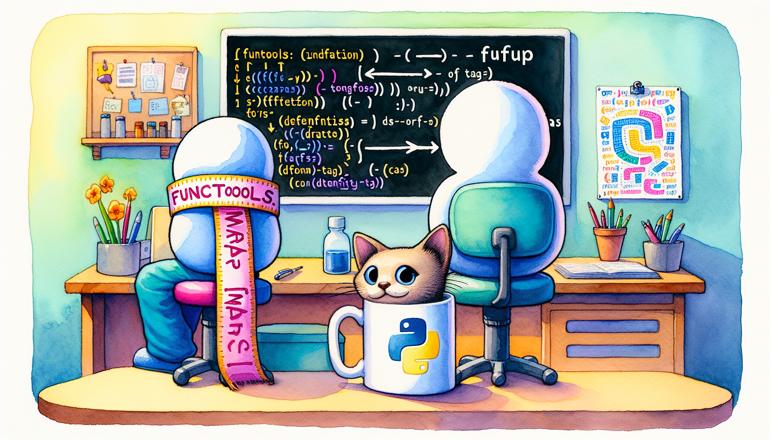
Python functools.wraps Explained
If you've ever worked with Python decorators, you've likely encountered a common issue: when you wrap a function, you lose some of its original identity—like its name, docstring, and other metadata. This is where functools.wraps comes to the rescue. In this article, we'll explore why this problem occurs, how wraps solves it, and when and how you should use it.
Understanding the Problem
Let’s start by writing a simple decorator without using functools.wraps:
def my_decorator(func):
def wrapper(*args, **kwargs):
print("Something is happening before the function is called.")
result = func(*args, **kwargs)
print("Something is happening after the function is called.")
return result
return wrapper
@my_decorator
def say_hello(name):
"""A friendly function that greets someone."""
print(f"Hello, {name}!")
say_hello("Alice")
If you run this, it works as expected. But if you try to inspect the function’s name or docstring:
print(say_hello.__name__)
print(say_hello.__doc__)
You’ll get:
wrapper
None
The function’s identity has been replaced by the wrapper’s. This might not seem like a big deal at first, but it can cause issues with debugging, documentation generation, and introspection.
Introducing functools.wraps
The functools.wraps decorator is designed to fix this exact problem. It copies the metadata from the original function to the wrapper function. Here’s how you use it:
import functools
def my_decorator(func):
@functools.wraps(func)
def wrapper(*args, **kwargs):
print("Something is happening before the function is called.")
result = func(*args, **kwargs)
print("Something is happening after the function is called.")
return result
return wrapper
@my_decorator
def say_hello(name):
"""A friendly function that greets someone."""
print(f"Hello, {name}!")
print(say_hello.__name__)
print(say_hello.__doc__)
Now the output is:
say_hello
A friendly function that greets someone.
Much better! The function retains its original name and docstring.
How Does It Work?
Under the hood, functools.wraps is a decorator that updates the wrapper function to look like the original function. It copies attributes such as __name__, __doc__, __module__, and __annotations__. You can also specify which attributes to copy or update using optional arguments.
Here’s a simplified version of what wraps does:
def wraps(original_func):
def decorator(wrapper_func):
wrapper_func.__name__ = original_func.__name__
wrapper_func.__doc__ = original_func.__doc__
# Copy other attributes as needed
return wrapper_func
return decorator
In reality, functools.wraps is more sophisticated and handles many more attributes and edge cases, but this gives you the basic idea.
When to Use functools.wraps
You should always use functools.wraps when writing decorators that wrap functions. It’s a best practice that ensures your decorated functions behave as much like the original as possible. This is especially important for:
- Debugging: When an error occurs, the traceback will show the original function name, not the wrapper’s.
- Documentation: Tools like Sphinx rely on
__doc__to generate documentation. - Introspection: Libraries that inspect function signatures or metadata will work correctly.
| Scenario | Without wraps | With wraps |
|---|---|---|
| Function name | wrapper | original_name |
| Docstring | None | Original docstring |
| Debugging ease | Harder | Easier |
| Documentation tools | May break | Work correctly |
Advanced Usage
You can also customize which attributes are copied by using the assigned and updated parameters of functools.wraps. The assigned parameter specifies which attributes to copy directly (default is ('__module__', '__name__', '__qualname__', '__doc__', '__annotations__')), and the updated parameter specifies which attributes to update (default is ('__dict__',)).
Here’s an example:
import functools
def my_decorator(func):
@functools.wraps(func, assigned=('__name__', '__doc__'), updated=())
def wrapper(*args, **kwargs):
print("Decorator action")
return func(*args, **kwargs)
return wrapper
This will only copy the __name__ and __doc__ attributes and skip updating __dict__.
Common Pitfalls and Solutions
While functools.wraps is incredibly useful, there are a few things to keep in mind:
- Signature Preservation:
functools.wrapsdoes not preserve the function signature. For that, you might needinspect.Signatureor third-party libraries likedecoratororwrapt. - Class Decorators: When decorating classes, the same metadata issues can occur. You can use
functools.wrapsin a similar way, but note that classes have different metadata attributes.
To handle signature preservation, you can use functools.wraps along with inspect.signature:
import functools
import inspect
def decorator(func):
@functools.wraps(func)
def wrapper(*args, **kwargs):
return func(*args, **kwargs)
# Update the signature to match the original
wrapper.__signature__ = inspect.signature(func)
return wrapper
However, this is a more advanced topic and often unnecessary for simple decorators.
Real-World Example
Let’s look at a practical example: a timing decorator that measures how long a function takes to run.
import time
import functools
def timer(func):
@functools.wraps(func)
def wrapper(*args, **kwargs):
start_time = time.time()
result = func(*args, **kwargs)
end_time = time.time()
print(f"{func.__name__} ran in {end_time - start_time:.4f} seconds")
return result
return wrapper
@timer
def slow_function(duration):
"""A function that sleeps for a given duration."""
time.sleep(duration)
return "Done"
slow_function(2)
Output:
slow_function ran in 2.0023 seconds
Thanks to functools.wraps, the function name in the print statement is slow_function, not wrapper.
Best Practices
When writing decorators, follow these best practices:
- Always use
functools.wrapsto preserve metadata. - Keep decorators simple and focused on a single task.
- Test your decorators with different types of functions to ensure they work as expected.
- Consider using third-party libraries like
wraptfor more advanced decorator needs.
By using functools.wraps, you make your decorators more robust and user-friendly. It’s a small addition that makes a big difference in maintaining the behavior and identity of your decorated functions.
Summary of Key Points
functools.wrapsis a decorator used to update the wrapper function to resemble the original function.- It copies metadata like
__name__and__doc__to avoid losing the original function’s identity. - You should use it in every decorator you write to ensure proper debugging and documentation.
- For advanced use cases, you can customize which attributes are copied using the
assignedandupdatedparameters.
Remember, good decorators are transparent, and functools.wraps helps you achieve that transparency. Happy coding!







